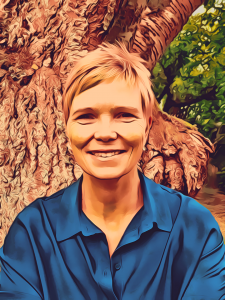120 Letter from Erika Andersson Cederholm
Dear future generations of tourism researchers,
More than 20 years has passed since I completed my doctoral thesis in sociology. For more than 30 years, the university has been my work place, either as a student or as a researcher and teacher. Research is my passion. To me, research is never just a job, and it is not simply a career; it is part of who I am as a person. I am quite sure that many of you share this passion.
I also know that being passionate about your work has a flip side, which is that you may devote much time and energy to a study, without any tangible or imminent rewards. Publication may take long time, and your research endeavors are not always funded. In my experience, it may take several years before a research idea is funded, if at all. Furthermore, the intrinsic value of research and the creation of new knowledge is sometimes at odds with more strategic or instrumental aims of the university or funding agencies. However, this tension is part of academia, and as a researcher, you may need to navigate between the intrinsic value of research, which can produce interesting, relevant knowledge, and economic and/or political aims that are more short-sighted.
Moreover, you may need to make compromises, as is often the case in collaborations. Research partners may work with different perspectives and different paradigms. Nevertheless, my advice is never compromise your research integrity. I would like to take this opportunity to illuminate the value of research integrity; I think it is an asset that academics in my generation and future generations must safeguard.
Universities and researchers are facing new challenges. Neoliberalism has paved the way for a marketized university, where the value of knowledge is increasingly measured in calculable terms. Intentions to promote knowledge sharing, such as peer-reviewing, are undermined by a ‘what’s in it for me´ attitude, which is reinforced by an environment full of performance and productivity metrics. In this academic environment, the intrinsic value of accumulating knowledge through research runs the risk of being overruled by instrumental values and more short-sighted aims. This development may be counteracted by maintaining and promoting research integrity.
How do you do that?
I would like to highlight three qualities – three C-words – that I see as building blocks of research integrity: curiosity, a critical attitude, and collegiality.
Curiosity implies looking for inspiration beyond your disciplinary boundaries. It pushes you to play with concepts, models, and theories. Creative work is playful, although it can also be systematic and serious. In many fields of research, the constituents demarcate, and even guard disciplinary boundaries, and they ask for contributions specific to that field. This is part of academic knowledge accumulation, and it is also part of the social world of science. However, if positioning your work becomes more important than accumulating knowledge, and if who you cite, and their field of research, becomes more important than what you cite, then curiosity will die. Although working within academic boundaries is part of academia, I would like to stress the importance of allowing the boundaries to remain sufficiently permeable to let inspiration in.
A critical attitude. The notion of ‘critical research’ may have multiple meanings in academia, and in academic policy. To me, being critical is to look at the world through discerning, analytic lenses. Being critical means daring to ask the naïve or uncomfortable questions. Being self-critical is to identify and reflect upon your own assumptions and the world view you have taken for granted. Being critical in your research is to choose study avenues based on the potential for new knowledge accumulation, even though they may be out of academic ‘fashion’ or contested for normative or ideological reasons.
Collegiality. Academia is, to a large degree, characterized by a gift economy. It is about sharing knowledge, and this is how new knowledge develops. This means that we engage in social sharing practices that build academic work, such as peer-reviewing, attending and organizing seminars, and participating in workshops. However, much of this work is considered invisible, because it is not counted in the university´s official performance metrics. A new type of collective effort should be made to make this type of work visible by applying credentials to it. A step in that direction is to continue giving and sharing, but make sure that you articulate the work you do, in talks and in publications, and that you give credit to others who do the same. Find words and use words – not metrics – that capture the moral economy of academia and that articulate the value of sharing, for the sake of producing knowledge. In this way, we can safeguard a sustainable working environment.
Research integrity is built from the ground up. It takes time to develop, and it cannot be marketized, because it does not work according to market logic.
Best wishes,

Erika Andersson Cederholm
Lund University, Sweden


